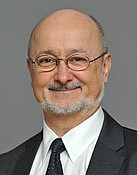Profiles of Leading Women Scientists on AcademiaNet.
Members
List of Members | Expert Search
Search among the members of the Leopoldina for experts in specific fields or research topics.

Alexander Waibel
| Year of election: | 2017 |
| Section: | Engineering Sciences |
| City: | Karlsruhe |
| Country: | Germany |
Research
Main research interests: Artificial Intelligence (AI), multilingual and multimodal human-machine interaction technologies, Time Delay Neural Network (TDNN)
Alexander Waibel is a Computer Scientist, well known for his work on Artificial Intelligence (AI), multilingual and multimodal human-machine interaction technologies. His scientific work was driven by the early conviction that intelligent systems must learn, and that complex language technologies must rely on machine learning and interaction.
This lead to early learning systems applied to speech and language. Waibel’s pioneering work on the Time-Delay Neural Network (TDNN, 1987) showed for the first time that neural networks could be learned shift- invariantly. It demonstrated that deep learning of patterns is possible, even when their exact position is not known. This most important property of TDNN’s was first shown in speech recognition and later applied to image classification under the general name “convolutional neural networks”. Extensions are now important building block element in most modern AI systems today.
Building on these and other machine learning advances, Waibel and his team proposed intelligent communication systems that make human communication easier. These included work on speech dictation, dialog systems, machine translation, synthesis, multi-modal interfaces, computer vision, and speech-to-speech translation: Waibel and his team proposed the first speech translation systems in Europe and the US (JANUS, 1991), the first visual road-sign translator (2001), the first translating goggles (2004), the first automatic simultaneous interpretation system of lectures (2005), and the first speech translation mass-market product on a phone (Jibbigo, 2009).
Waibel’s research is also concerned with understanding multiple communication signals in their joint communicative intent. This is central to making human interfaces more natural and effective. The resulting innovations included: computer lipreading (1993), cross-modal error-repair (1994-1998), emotion recognition from speech (1996), focus of attention tracking (1998) and meeting transcription, tracking and browsing (1998). Waibel holds many patents for work in these areas.
His work is also characterized by a passion for fundamental science and transitioning it to public use: Waibel founded and co-founded more than 10 start-up companies, provided technology support for humanitarian crises and healthcare missions, and developed and deployed the first simultaneous interpreting service for University lectures (KIT). He is now also working with the European Parliament on advanced language support.
Career
- Director, International Center for Advanced Communication Technologies (InterACT)
- 2013-2014 Founding Director, Speech technology group, Facebook
- since 1990 Professor of Computer Science at Interactive Systems Labs, Karlsruher Institut für Technologie (KIT), and Professor of Computer Science at Language Technologies Institute, Carnegie Mellon University (CMU), Pittsburgh, USA
- 1986 PhD in Computer Science, Carnegie Mellon University, USA
- 1980 M.S. in Computer Science, Carnegie Mellon University, USA
- 1979 B.S. in Electrical Engineering, Massachusetts Institute of Technology, USA
Functions
- 1998-2000 Head of C-STAR (Consortium for Speech Translation Advanced Research)
- 1991 Co-Founder of C-STAR
Projects
- since 2017 DFG project “Simultanes Dolmetschen von Vorlesungen von/nach Deutsch”
- 2013-2015 DFG project “Entwicklung eines Instruments zur automatischen Rechtschreibfehleranalyse in frei erfassten, deutschen Lernertexten”
- 2012-2015 Project leader within the European integrated program EU-BRIDGE
- 2006-2014 DFG Cluster of Excellence EXC 142 “Kognition für technische Systeme – CoTeSys”
- 2004-2007 Leader CHIL Program “Integriertes Projekt zur Multimodalität”, EU
- 2001-2012 DFG project “Multimodale Interaktion und Dialoge”, part of SFB 588 “Humanoide Roboter: Lernende und kooperierende multimodale Roboter”
- 2001-2008 DFG project “Belehren und Lernen auf Basis interaktiver Handlungsanalyse und –modellierung”, part of SFB 588
- 1993-2000 BMBF Project “Verbmobil”
- Leader NSF ITR project STR-DUST, USA
- Coordinator of the Franco-German Joint Venture IMMI
- Coordinator of the Franco-German project Quaero
Honours and Memberships
- since 2017 Member of the German National Academy of Sciences Leopoldina
- 2017 Ehrensenator, Hochschulrektorenkonferenz
- 2014 TAUS Excellence Award for work on Speech Translation
- 2014 Zampolli Prize
- 2002 Speech Communication Best Paper Award
- 2002 Allen Newell Award for Research Excellence, CMU
- 1994 Alcatel SEL Research Prize for Technical Communication
- 1990 IEEE Best Paper Award
- Fellow of the Institute of Electrical and Electronics Engineers (IEEE)

